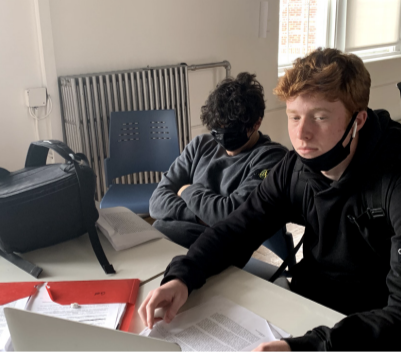Sleep Deprivation: “The New Epidemic”
Nearly a month into school, demanding academic expectations have begun to affect the student population of Poly Prep. The result, sleep deprivation, has led to concerns surrounding declines in participation, focus, academic success, and overall health.
Sleep deprivation, the “new epidemic,” is a phenomenon that can affect individuals regardless of their age. Nonetheless, sleep deprivation disproportionately affects teens and can lead to various health-related struggles. To highlight the sleep needs of teenagers, Mary Carskadon, Ph.D., a professor of psychiatry at Brown University and director of chronobiology and sleep research at Bradley Hospital, said in a study, “Teenagers actually need more sleep than younger kids, not less. Nine and a quarter hours of sleep is what they need to be optimally alert.”
Despite this goal, a 2010 study published in the Journal of Adolescent Health found that “8 percent of US high school students get the recommended amount of sleep,” further proving the normalization of sleep deprivation.
In the specific case of students from Poly Prep, a survey taken of 13 students aged 14 through 18 revealed that, on average, students get six hours of sleep per school night. This is two hours less than the recommended amount of sleep.
Based on the Child Mind Institute research, the four main contributing factors to teenage sleep deprivation are biology, homework, technology, and overscheduling. First, the natural biology of a teenager affects melatonin levels, the hormone that affects sleep. Along with biological shifts of melatonin, the use of technology also alters melatonin levels. For example, the blue light from computer and phone screens signals the brain to limit its melatonin production. In addition, the homework leaves an unavoidable task for students to complete daily.
The Cleveland Clinic, a peer-reviewed medical journal, highlighted high blood pressure, diabetes, heart attack, heart failure, stroke, obesity, and depression as some of the possible long-term effects of sleep deprivation.
At Poly Prep, school days run from 9:00 a.m. to 3:40 p.m., with early busses leaving at 4:00 p.m. Based on a survey taken of 10 Poly Prep students located across three different boroughs, this departure time allows students to arrive home between 4:45-5:00 p.m. In the case of taking the late bus, which departs at 6:00 p.m., the same 10 students report arriving home anywhere between 7:15-7:45 p.m. Furthermore, 80 percent of these students revealed that they take the late bus at least twice a week due to involvement with sports, clubs, or service-learning teams.
From a survey done on these 10 students, each reported that they spend anywhere between two and three and a half hours completing homework per night.
Chloe Yaffe, a sophomore, demonstrates a real-life example of these averages. Yaffe is in seven classes and a member of the Poly Prep tennis team. Yaffe takes the late bus at least three times a week and occasionally arrives early for tennis practice. Yaffe claims to get an average of six hours of sleep per night. The effect of her sleep deprivation is demonstrated through its adverse impact on her attention and concentration in certain classes. When referring to the so-called “cycle” of sleep deprivation she experiences, Yaffe said, “It becomes a cycle where I am then too tired to pay attention in class, which then leads me to staying up even longer at night when completing my homework.”
Yafffe’s struggle with retaining information when tired demonstrates a pervasive and immediate effect of sleep deprivation. This side effect is memory loss.
To explain why students may have difficulty with memorizing information following a poor night of sleep, Ronald Sarcos, a Spanish and psychology teacher, said, “The first thing that sleep deprivation will affect negatively is memory. During deep sleep, different areas of the brain review and process the new skill that we have learned.”
Because sleep acts as a way for the brain to retain new information and lessons, a lack of sleep can leave students with an unsolidified understanding of what they have been learning.
To offer a strategy for students wanting to balance both their sleep and studies, Sarcos suggested a sleep-saving study technique. “I recommend that students do not stay up all night if they are studying for a test. It is more effective to study in smaller increments for multiple nights and get a good night’s sleep. Students will be able to retain more information and be well-rested,” he said.
Sean Mullin, an English teacher, teaches students aged 15 through 19. From an educator’s perspective, Mullin claims to recognize sleep deprivation in his students. “I notice signs of sleep deprivation in my students when they yawn, put their head down on the desk, and close their eyes,” he said. “In terms of focus and participation, a sleep-deprived student has a ripple effect on the classroom. Just as an alert, engaged student has a positive effect on a classroom environment, a tired, unalert student has an opposite effect.”
When students display signs of sleep deprivation, it not only alters their engagement in class but also affects their peers’ engagement. Therefore, this negatively influences the learning experience of the class as a whole.
“I view sleep deprivation as an epidemic,” said Mullin. “As a student, it’s hard to avoid and can easily take a negative toll on individual learners and a classroom.”

Charlotte Roberts is a current Head Layout Editor for the Polygon. Charlotte has been a layout editor for two years and has written for the Polygon for...


























